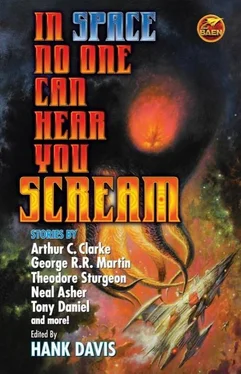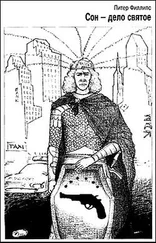Питер Филлипс - In Space No One Can Hear You Scream
Здесь есть возможность читать онлайн «Питер Филлипс - In Space No One Can Hear You Scream» весь текст электронной книги совершенно бесплатно (целиком полную версию без сокращений). В некоторых случаях можно слушать аудио, скачать через торрент в формате fb2 и присутствует краткое содержание. Город: Riverdale, NY, Год выпуска: 2013, ISBN: 2013, Издательство: Baen Books, Жанр: Фантастика и фэнтези, на английском языке. Описание произведения, (предисловие) а так же отзывы посетителей доступны на портале библиотеки ЛибКат.
- Название:In Space No One Can Hear You Scream
- Автор:
- Издательство:Baen Books
- Жанр:
- Год:2013
- Город:Riverdale, NY
- ISBN:978-1-4516-3941-4
- Рейтинг книги:4 / 5. Голосов: 1
-
Избранное:Добавить в избранное
- Отзывы:
-
Ваша оценка:
- 80
- 1
- 2
- 3
- 4
- 5
In Space No One Can Hear You Scream: краткое содержание, описание и аннотация
Предлагаем к чтению аннотацию, описание, краткое содержание или предисловие (зависит от того, что написал сам автор книги «In Space No One Can Hear You Scream»). Если вы не нашли необходимую информацию о книге — напишите в комментариях, мы постараемся отыскать её.
In Space No One Can Hear You Scream — читать онлайн бесплатно полную книгу (весь текст) целиком
Ниже представлен текст книги, разбитый по страницам. Система сохранения места последней прочитанной страницы, позволяет с удобством читать онлайн бесплатно книгу «In Space No One Can Hear You Scream», без необходимости каждый раз заново искать на чём Вы остановились. Поставьте закладку, и сможете в любой момент перейти на страницу, на которой закончили чтение.
Интервал:
Закладка:
I said, “How do you—feel, cap’n?”
“Swell,” he said. He frowned. “Why? You feel all right?”
Not right then, I didn’t. Captain Parks batty? That was just a little bit lousy. If Renn was right—and he was always right—then his board had given Parks the works, as well as the rest of the crew. All but me, that is. I knew I wasn’t crazy. I didn’t feel crazy. “I feel fine,” I said.
“Well, go ahead then,” said Parks, and turned his back.
I went over to the control board, disconnected the power leads from the radioscope, and checked the dials. For maybe five minutes I felt the old boy’s eyes drilling into the nape of my neck, but I was too upset to say anything more. It got very quiet in there. Small noises drifted into the control room from other parts of the ship. Finally I heard his shoulder brush the doorpost as he walked out.
How much did the captain know about this trip? Did he know that he had a bunch of graduates from the laughing academy to man his ship? I tried to picture Renn informing Parks that he was a paranoiac and a manic depressive, and I failed miserably. Parks would probably take a swing at the doctor. Aw, it just didn’t make sense. It occurred to me that “making sense” was a criterion that we put too much faith in. What do you do when you run across something that isn’t even supposed to make sense?
I slapped the casing back on the radioscope, connected the leads, and called it quits. The speaker over the forward post rasped out, “All hands report to control chamber!” I started, stuck my tools into their clips under the chart table, and headed for the door. Then I remembered I was already in the control room, and subsided against the bulkhead.
They straggled in. All hands were in the pink, well fed and eager. I nodded to three of them, shook hands with another. The skipper came in without looking at me—I rather thought he avoided my eyes. He went straight forward, faced about and put his hands low enough on the canted control board so he could sit on them. Seabiscuit, the quartermaster, and an old shipmate of mine, came and stood beside me. There was an embarrassed murmur of voices while we all awaited the last two stragglers.
Seabiscuit whispered to me, “I once said I’d sail clear to Hell if Bill Parks was cap’n of the ship.”
I said, out of the side of my face, “So?”
“So it looks like I’m goin’ to,” said the Biscuit.
The captain called the roll. That crew was microscopically hand picked. I had heard every single one of the names he called in connection with some famous escapade or other. Harry Voight was our chemist. He is the man who kept two hundred passengers alive for a month with little more than a week’s supply of air and water to work with, after the liner crossed bows with a meteorite on the Pleione run. Bort Brecht was the engineer, a man who could do three men’s work with his artificial hand alone. He lost it in the Pretoria disaster. The gunner was Hoch McCoy, the guy who “invented” the bow and arrow and saved his life when he was marooned on an asteroid in the middle of a pack of poison-toothed “Jackrabbits.” The mechanics were Phil and Jo Hartley, twins, whose resemblance enabled them to change places time and again during the Insurrection, thus running bales of vital information to the league high command.
“Report,” he said to me.
“All’s well in the control chamber, sir,” I said formally.
“Brecht?”
“All’s well back aft, sir.”
“Quartermaster?”
“Stores all stored and stashed away, sir,” said the Biscuit.
Parke turned to the control board and threw a lever. The air locks slid shut, the thirty-second departure signal began to sound from the oscillator on the hull and from signals here and in the engineer’s chamber. Parks raised his voice to be heard over their clamor.
“I don’t know where we’re goin’,” he said, with an odd smile, “but—” the signals stopped, and that was deafening—“we’re on our way!”
The master control he had thrown had accomplished all the details of taking off—artificial gravity, “solar” and “planetary” stases, air pumps, humidifiers—everything. Except for the fact that there was suddenly no light streaming in through the portholes any more, there was no slightest change in sensation. Parks reached out and tore the seals off the tape slot on the integrators and from the door of the orders file. He opened the cubbyhold and drew out a thick envelope. There was something in my throat I couldn’t swallow.
He tore it open and pulled out eight envelopes and a few folded sheets of paper. He glanced at the envelopes and, with raised eyebrows, handed them to me. I took them. There was one addressed to each member of the crew. At a nod from the skipper, I distributed them. Parks unfolded his orders and looked at them.
“Orders,” he said. “By authority of the Solar League, pertaining to destination and operations of Xantippean Expedition No. 1.”
Startled glances were batted back and forth. Xantippe! No one had ever been to Xantippe. The weird, cometary planet of Betelgeuse was, and had always been, taboo—and for good reason.
Park’s voice was tight. “Orders to be read to crew by the captain immediately upon taking off.” The skipper went to the pilot chair, swiveled it, and sat down. The crew edged closer.
“The League congratulates itself on its choice of a crew for this most important mission. Out of twenty-seven hundred volunteers, these eight men survived the series of tests and conditioning exercises provided by the league.
“General orders are to proceed to Xantippe. Captain and crew have been adequately protected against the field. Object of the expedition is to find the cause of the Xantippe Field and to remove it.
“Specific orders for each member of the crew are enclosed under separate sealed covers. The crew is ordered to read these instructions, to memorize them, and to destroy the orders and envelopes. The league desires that these orders be read in strictest secrecy by each member of the crew, and that the individual contents of the envelopes be held as confidential until contrary orders are issued by the league.” Parks drew a deep breath and looked around at his crew.
They were a steady lot. There was evidence of excitement, of surprise, and in at least one case, of shock. But there was no fear. Predominantly, there was a kind of exultance in the spaceburned, hard-bitten faces. They bore a common glory, a common hatred. “That isn’t sensible,” I told myself. “It isn’t natural, or normal, or sane, for eight men to face madness, years of it, with that joyous light in their eyes. But then—they’re mad already, aren’t they? Aren’t they? ”
It was catching, too. I began to hate Xantippe. Which was, I suppose, silly. Xantippe was a planet, of a sort. Xantippe never killed anybody. It drove them mad, that was all. More than mad—it fused their synapses, reduced them to quivering, mindless hulks, drooling, their useless minds turned supercargo in a useless body. Xantippe had snared ship upon ship in the old days; ships bound for the other planets of the great star. The mad planet used to blanket them in its mantle of vibrations, and they were never heard from again. It was years before the league discovered where the ships had gone, and then they sent patrols to investigate. They lost eighteen ships and thirty thousand men that way.
And then came the Forfield Drive. In the kind of static hyperspace which these ships inhabited, surely they would pass the field unharmed. There were colonists out there on the other planets, depending on supplies from Sol. There were rich sources of radon, uranium, tantalum, copper. Surely a Forfield ship could—
Читать дальшеИнтервал:
Закладка:
Похожие книги на «In Space No One Can Hear You Scream»
Представляем Вашему вниманию похожие книги на «In Space No One Can Hear You Scream» списком для выбора. Мы отобрали схожую по названию и смыслу литературу в надежде предоставить читателям больше вариантов отыскать новые, интересные, ещё непрочитанные произведения.
Обсуждение, отзывы о книге «In Space No One Can Hear You Scream» и просто собственные мнения читателей. Оставьте ваши комментарии, напишите, что Вы думаете о произведении, его смысле или главных героях. Укажите что конкретно понравилось, а что нет, и почему Вы так считаете.









